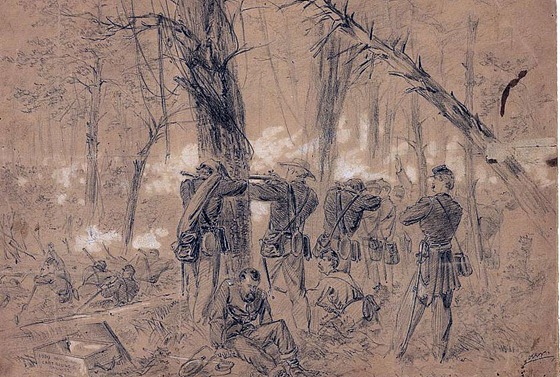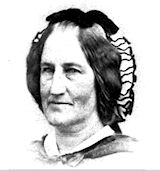June 30.—McClellan certainly retreating. We begin to breathe more freely; but he fights as he goes. Oh, that he may be surrounded before he gets to his gun-boats! Rumours are flying about that he is surrounded; but we do not believe it—only hope that he may be before he reaches the river. The city is sad, because of the dead and dying, but our hearts are filled with gratitude and love. The end is not yet—oh that it were!
June 2012

“The city is sad, because of the dead and dying, but our hearts are filled with gratitude and love.”—Diary of a Southern Refugee, Judith White McGuire.
JUNE 30TH.—Once more all men are execrating Gen. Huger. It is alleged that he again failed to obey an order, and kept his division away from the position assigned it, which would have prevented the escape of McClellan. If this be so, who is responsible, after his alleged misconduct at the battle of the Seven Pines?
Richmond, June 30, 1862.
Dear Father, — I am perfectly well and unhurt. We are all treated as well and kindly as is possible. I send you a list of Massachusetts officers injured in the fight, and made prisoners.
22d Massachusetts
Col. Gove, killed.
Capt. Dunning, killed, Boston.
Capt. Whorf, E. Cambridge, wounded in arm, prisoner.
Lieut. Stearns of Brookline, wounded in leg, prisoner.
Lieut. Washburn, Taunton, wounded and prisoner.
Lieut. Styles, wounded and prisoner.
Capt. Conant, prisoner.
Lieut. Crane, from Woburn, ditto.
Dr. Prince, ditto.
Major Tilton, wounded in shoulder and prisoner.
Dr. Milner, prisoner.
Lt. Col. Varney of 2d Maine is also a prisoner.
Sherwin I think is safe and not a prisoner.
Lieut. E. W. Whittemore of 17th Reg., and from Cambridge, is not a prisoner.
9th Massachusetts
Col. Cass, wounded and not a prisoner.
First Lieut. P. W. Black, prisoner.
Lieut. O’Hara, ditto.
Please let friends of prisoners know.
June 30th.
As a specimen of the humanity of General Butler, let me record a threat of his uttered with all the force and meaning language can convey, and certainly enough to strike terror in the hearts of frail women, since all these men believe him fully equal to carry it into execution; some even believe it will be done. In speaking to Mr. Solomon Benjamin of foreign intervention in our favor, he said, “Let England or France try it, and I’ll be — if I don’t arm every negro in the South, and make them cut the throat of every man, woman, and child in it! I’ll make them lay the whole country waste with fire and sword, and leave it desolate!” Draw me a finer picture of Coward, Brute, or Bully than that one sentence portrays! O men of the North! you do your noble hearts wrong in sending such ruffians among us as the representatives of a great people! Was ever a more brutal thought uttered in a more brutal way? Mother, like many another, is crazy to go away from here, even to New Orleans; but like the rest, will be obliged to stand and await her fate. I don’t believe Butler would dare execute his threat, for at the first attempt, thousands, who are passive now, would cut the brutal heart from his inhuman breast.
Monday, 30th—The Eleventh Iowa was mustered for pay this morning. The men all looked fine—well and clean. None had on ragged clothing and few were absent from the regiment on account of sickness.
This ends June, with us in a good camp near Corinth, Mississippi.
Flat Top Mountain, June 30, 1862.
Dearest : — I write by Captain Gardner, who having been promoted to captain in [the] quartermaster’s department, now leaves our regiment. I send a package of your letters, some Secesh letters, etc., etc. I do not wish to lose the letters and official documents, and send them to you for safety.
“We are well and doing well at this present time and hope these few lines will find you enjoying the same blessing.” Why, that is a good letter. No wonder the uninitiated ride that formula so hard. It says a great deal. . . .
As ever, affectionately, your
R.
Mrs. Hayes.
30th. Monday. Arose at 2:30. Marched at 4 A. M. Reached Cowskin at noon, and Rains’ camp at 3 P. M., which he had deserted the day before. Found the Indians before us encamped near by. Four companies, Ninth Rabb’s Battery and Second and Third Battalion came from Neosho. Nothing particular by the way. Noticed some places well remembered when Major Purington was down. Mustered for pay. Pitched tent loosely for the Major and Adjutant and made our beds outside. Thunderstorm camp up, tent blew over and such a time I never had before. Soaking wet all of us, but nearly the whole force fared the same way.
From Harper’s Weekly, August 9, 1862:
On the … we give a picture of KEARNEY’S DIVISION AT WORK, on Monday, June 30. Mr. Waud says:
“In a fight, such as is represented in the picture, it is impossible to get a view of an extended line of battle from any one point. A majority of the battles so far have been of this description, usually termed bushwhacking—very deadly, but hardly affording a chance for a display of tactics. For the rest, the picture describes itself, and gives a good idea of what our soldiers have to stand up to in the Virginia swamps and woods.”
From Library of Congress:
Title: Fighting in the woods Kearneys divison repulsing the enemy Monday June 30th 1862
- Signed lower right: A.R. Waud.
- Title inscribed below image.
- Published in: Harper’s Weekly, August 9, 1862, p. 500.
- Inscribed on box in image: 1000 … Cartridges Call 52.
Part of Morgan collection of Civil War drawings.. Library of Congress Prints and Photographs Division Washington, D.C.
Record page for this image: http://www.loc.gov/pictures/item/2004660376/
30th.—The night’s march had placed a considerable distance between us and our pursuers. The morning opened bright and balmy. Again our division had to be brought to the rear, and we continued to march and to countermarch for position till about noon, when we halted in line of battle, and waited till our troops and transportation had all passed up. We had thrown out our videttes and pickets, and had lain down to keep out of sight. We began to stretch out our limbs for a little rest, when instantly, and almost simultaneously, fifty-three of the enemy’s shells burst upon us. I doubt whether the Malakoff, in the “infernal fire” which reduced it, witnessed such an opening of a cannonade. Mott’s battery was almost instantly demolished; most of his horses and some of his men killed by their first fire. Just here a little incident occurred, and which was rather amusing, if anything can amuse in such circumstances. I had taken my hospital corps and litter bearers some distance in the rear, in a deep gorge, where they could be out of danger, and where we could have plenty of water for the convenience of our wounded. I had left them and gone to the line. The burst of artillery came. I ran back to see that litter bearers were ready, but arrived just in time to see their backs as with the litters they passed over the hill on a full run. I ran to the top of the hill, ordered them to halt, but on they went. I ran on calling to them, and sent three pistol balls whistling after them. On they went. At a moment’s reflection, I raised my voice, and uttered a great mouthful of oaths—not natural, but got up for the occasion. They stopped as if an iron wall had dropped before fore them. They returned, and were surprised to find me alone. ‘Twas difficult to convince them that it was I who swore. They did not believe “that any man in the army, save our Brigadier, could utter any such oaths as that.” I felt flattered, and thought that I had earned promotion. Immediately on the opening, our whole line was on its feet. We were ordered to change our position. We started on the double quick, directly away from the enemy. The order as to the position we should take was misunderstood, and we moved rapidly for about a mile. The day was intensely hot, but the men marched well and vigorously. Suddenly an order brought us to a halt, made us aware of our mistake, wheeled us to march back towards the enemy, and it is surprising what a difference was made in the vigor of the men, by marching west instead of east. Directly on their being faced to march towards the enemy, the sun’s rays pierced so violently that they commenced falling from sunstroke. The effects, however, were not serious, for as soon as the column had marched by, the fallen men arose and starting again away from the enemy found themselves so well that most of them ran from ten to eighteen miles before night.
We got back into line, facing the enemy; but from some cause unknown to me, they commenced withdrawing their forces from our wing, and swung them over to our left, on White Oak Swamp, about two miles to the southwest of us, where McCall, Porter, Sedgwick, Hooker, and a host of others were battling for life. McCall’s Division is badly cut to pieces. We learn to-night that he is himself a prisoner, and that of all his staff, but one is left to tell the story. Our troops held their position, and after night had drawn a curtain betwixt us and our pursuers, with whisperings and hints of the necessity of capitulation, we resumed our march, nor halted till the sun was lighting up for the resumption of our perilous task of defence.
Jane Eliza Newton Woolsey to her son, Charles.
June 29 or 30.
Your last letter this moment come! We know not what to think. Dear E. [Eliza], what a heroine she shows herself. This slight wound may be the means of saving Joe from greater danger, as he must now lie by. Dear boy, how sad we feel about him. Our best love to him when you can. How very anxious we are to hear more. Thank you and G. for letters. We feel thankful it is no worse with Joe. Let this feeling keep up all your hearts. Our dear love to Eliza; I am rejoiced she is so brave. I wish I were there to help take care of Joe. Let us hear at once all you know.










